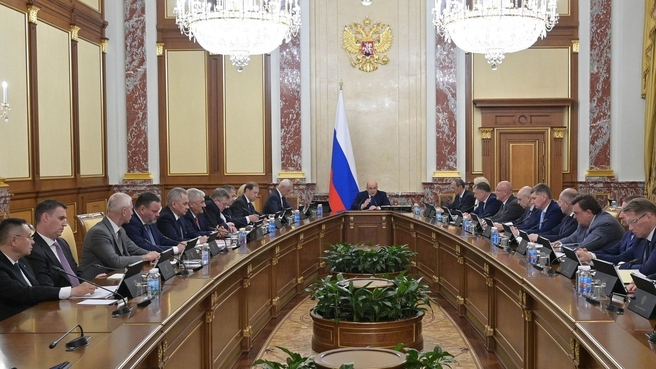Mikhail Mishustin’s opening remarks:
Good afternoon, colleagues.
Today’s Government meeting will focus on a whole block of issues related to support for our manufacturers.
As the President emphasised, businesses that make and implement long-term plans designed to strengthen the technological, industrial and agricultural sovereignty of Russia should receive assistance at all levels of government.
The Government has proposed an entire range of measures to help enterprises that manufacture Russian products, including the popular preferential investment loans, loan guarantees, compensation for part of the cost of equipment leasing, and other measures.
Efforts to improve the regulatory framework for generating demand for domestic goods continue. Today we will consider a draft law that would make the process to certify that products are made in Russia more user-friendly. And entrepreneurs will no longer have to draw up numerous papers for it. Now all the information necessary for making such decisions will be immediately entered into the appropriate register.
Thanks to a completely online system, business opportunities to receive government support measures will also increase. Domestic products will be given priority in public procurement, as well as in investment projects with state participation.
I would like to discuss support for Russian manufacturers of children’s goods.
As per the President’s instructions, we have expanded the list of items covered by the 50 percent VAT reduction; from now on, we will charge 10 percent VAT on them.
The current list includes motor vehicle seats and childcare products, all items that make children comfortable and safe.
In April 2023, we started charging reduced VAT on baby cribs. Companies manufacturing children’s clothing, footwear, prams, mattresses, educational and artistic goods are already taking advantage of lower taxes.
This draft resolution will allow enterprises to spend an additional 4 billion-plus roubles on development annually. This will create favourable conditions for manufacturing children’s goods in Russia. Of course, families with children will be able to buy the goods they need more easily.
Here is the next issue. As per the President’s instructions, we continue to quickly relocate people from housing that was rundown and dilapidated prior to 1 January 2017.
We are set to spend over 430 billion roubles in federal funding on this six year programme. We will use the high priority financing system to replace rundown and dilapidated housing with new residential buildings in over 50 percent of Russian regions ahead of schedule before the year is out. We are planning to complete this work in 2024.
Today, we will provide the Moscow Region with over 1.4 billion roubles to reduce their rundown housing. This solution will allow us to renew about 18,000 square metres of housing. Consequently, people will be able to move to comfortable and safe flats more quickly.
At the same time, we continue to implement a new programme for relocating residents from rundown and dilapidated housing that received this status from 1 January 2017. This programme has enabled about 9,500 people in 14 regions to improve their living conditions.
Colleagues, I would like to say that you should use this budgetary funding as effectively as possible. The people covered by these programmes should see the results of this work.
Our next issue deals with the development of the domestic tourism industry.
Travellers are visiting nature reserves and specially protected areas more often. As the President noted, it is important that state agencies, businesses and tourists know what they can or cannot do there in order to avoid damage to vulnerable ecosystems.
We need to implement the engineering and transport solutions and improvement projects on specific tourist routes in these areas. As instructed by the President, we are allocating the required funding under the national project Tourism and the Hospitality Industry. Today, we will reallocate about 1.5 billion roubles for infrastructure projects in specially protected nature areas and for eco-friendly tourism development.
We will also distribute over 1 billion roubles to the Republic of Adygea, the Kamchatka Territory, and the Tver and Yaroslavl regions. This will make it possible to expedite new projects for developing the tourism cluster infrastructure in these four territories.
We hope these measures will help reduce the impact on the environment, and that they will provide our citizens with more convenient leisure and hiking opportunities.












